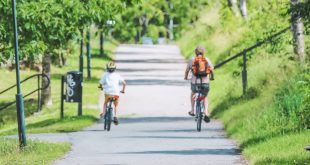In September, Richard Nye, the editor of luxury title The Richmond Magazine, penned an editorial for the 118-page September issue that said "the only good cyclist is a dead one." 40,000 copies of the magazine are distributed in the upscale London suburbs of Richmond, Twickenham and Barnes.
Nye’s editorial described the surprise of enjoying Olympic cycling but, before recounting an episode of in-car road rage against a cyclist, Nye wrote of his "relief" at lapsing back into his "normal" cyclist-hating ways. He wrote: "…as a daily driver on busy roads, I tend towards the temperate view that the only good cyclist is a dead one." Advertisers, including Moore’s Bike Shop, Sigma Sport and Action Bikes, said they would not advertise in the magazine if Nye remained as editor. Following this, and worldwide condemnation of his editorial – from Australia to the USA – Nye issued an apology, claiming his article was meant to be ironic.
Speaking to The Times, Nye said: “With regard to my remark about the only good cyclist being a dead one, it is just a phrase, like people who said during the Cold War that ‘the only good Russian is a dead one’. It’s a standard English phrase. It doesn’t actually mean you want to see that person dead.
[In fact, this is a highly offensive phrase and originated in the US in 1869 when General Phillip Sheridan said "The only good Indians I ever saw were dead." This later morphed into "The only good Indian is a dead Indian," and has been subsequently used for Jews, black people and others perceived to be members of out-groups. Such ‘proverbial invectives’ against minorities are "dangerous slurs" and "unfortunate and misguided expressions of hate and prejudice," says an academic expert on American folklore.]Nye continued: “I was suggesting that I used to be really angry at cyclists, then we all had this cycling love-in at the Olympics, and then to my relief I went back to being this angry person again. That’s not actually something to be relieved about. It had irony written all over it. I don’t shout such things at cyclists.”
He admitted: “If I were writing the piece again, I perhaps wouldn’t choose to use that phrase and if there are individuals out there who have suffered a painful loss as a result of a cycle accident, then to those individuals I am very sorry and it certainly wasn’t anywhere in my thoughts at all to think about cycling fatalities when I wrote that line.”
However, digging a hole for himself, he added “a lot of cyclists behave in ways that don’t help anyone, least of all themselves.”
The Richmond Cycling Campaign offered to take Nye on a guided bike ride around the area so he could see at first hand how some drivers treated cyclists.
Alastair Barr of the campaign group said: "Although we felt Mr Nye’s comments were extremely badly misjudged to say the least we didn’t believe there was anything to be gained from pursuing a personal vendetta against Mr Nye or the magazine. So we gave an invitation to Richard to come along to one of our rides to see some of the issues we face on the roads and hopefully highlight why the reaction was as strong as it was."
However, it turned out Nye had never learned to ride a bicycle so was unable to attend an accompanied ride. Instead, Richmond Cycling Campaign invited Nye to see how children in the borough are put through a cycle training course run by The Turning Hub, Richmond’s mobile bike club.
"We wanted him to witness the enthusiasm of kids for cycling but to also understand the barriers to cycling to school in the borough," said Barr.
"It was an interesting event, on a particularly cold rainy day in November, and he came away seeing the evident enthusiasm of the kids and, we hope, a new perspective of cycling and cyclists."
An article has now appeared in Nye’s magazine, written from the perspective of a mother who cycles with her son to school. The article’s intro is this:
“On a muddy school playing field in Twickenham, a group of boisterous 13 and 14 year olds are making tighter and tighter turns around a circuit of bollards. Over the months, instructor Jonathan Rowland from The Turning Hub – a bike club run by local enthusiasts – has not only improved their skills, but has lit their interest in adventure cycling. Their chatter is full of bike polo, cycle cross and long rides to the Surrey Downs. But as we turn to leave, the bikes go back in the lock-up. Not one of the participants has cycled to school. It’s not safe, shrugs Jonathan, gesturing to the road beyond the school gates, a snare of fast moving traffic straying in and out of a narrow painted cycle lane.”
The rest can be read via this PDF.
 BikeBiz Bicycle and cycling retail news
BikeBiz Bicycle and cycling retail news



